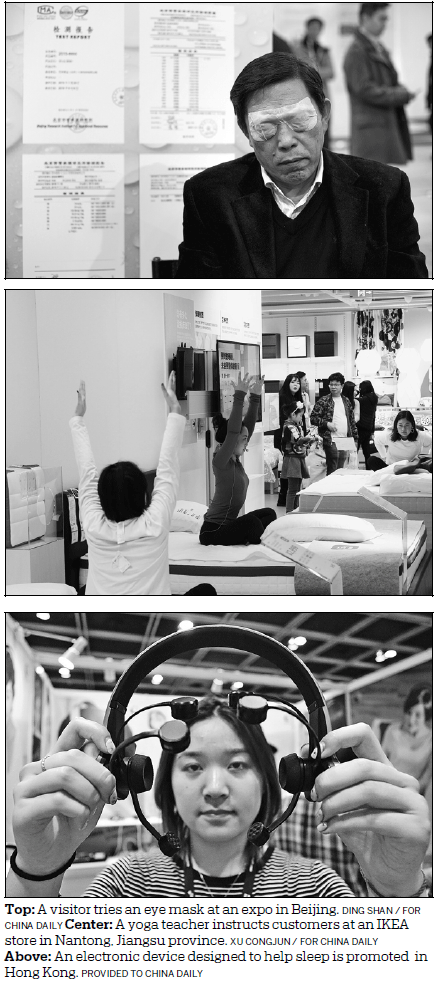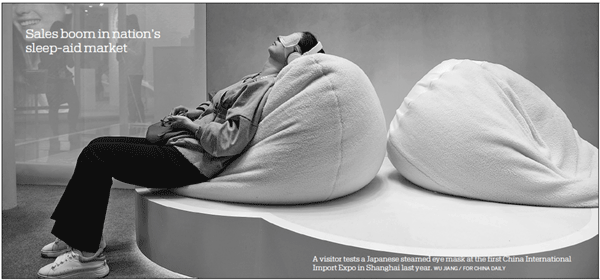Sound solutions pave way to a good night's rest
Sales boom in nation's sleep-aid market
Earplugs, an eye mask and a melatonin pill are all essential for 22-year-old Peng Yujiang to sleep well at night.
Before he used these aids, a proper night's rest was largely elusive for Peng, a postgraduate at the Communication University of China in Beijing.
"Sometimes, deep into the night, I would still be thinking about things and unable to fall asleep. Before taking important exams, I was often awake the whole night," he said.
Sun Xiaocheng, an analyst with research company CBNData in Shanghai, said an increasing number of people in China, including the younger generation, are having problems getting proper sleep, and this has triggered a boom in the sleep-aid market.
According to the Chinese Sleep Research Society, just over 38 percent of adults in the country, or more than 300 million people, have sleep problems, and the number is rising.

"Over the past few years, Chinese have increased their awareness of sleep health and have acknowledged that a good night's rest is essential to their well-being and efficiency at work," Sun said. "The younger generation, in particular, is keen on trying new sleep-friendly products, ranging from bedding to monitoring gadgets."
Zhang Bin, the society's director and deputy secretary-general, estimates that the sleep-aid market in China has reached more than 100 billion yuan ($14.6 billion).
A report from CBNData said that about 84 percent of Chinese are willing to seek solutions when they experience sleeping problems, and in the past three years, sales of online products designed to help sleep have grown annually by more than 10 percent.
People born in the 1980s and '90s are the main market for such products, with those born after 1995 spending the most.
The report said work pressures are the main reason for insomnia, with 70 percent of people affected by it, followed by stress and their environment.
Jason Yu, general manager of Kantar Worldpanel China, said fierce competition at work puts many people under great pressure, especially the younger generation who are climbing the career ladder. This will affect their quality of sleep.
Long working hours and a wide variety of leisure choices could result in them going to bed later. It has also become routine for people to check their mobile phones before going to bed as a way of releasing pressure and entertaining themselves, he said.
To meet the growing demand for better sleep, a wide range of products has emerged in recent years, with more companies eyeing this market.
"The sleep-aid market has huge potential," Yu said. As an example, he said sales of melatonin products - which induce sleep quickly - in China have seen double-digit growth in recent years, but even so, are used by fewer than 1 percent of Chinese consumers, indicating there is huge scope for business to grow.
The Nature's Bounty Company, a health and wellness business in the United States, has targeted the huge Chinese market. In August, it opened online stores on major e-commerce platforms Tmall and JD to give consumers direct access to its wide range of products without the need to travel overseas.
Charles Yam, the company's managing director for Greater China, said that over the past few years, insomnia has not just been an issue for China but a global problem, including in the United States, which has seen a rapid increase in demand for melatonin products.
The 2008 financial crisis is still having an impact on the US and European economies, while China is also facing some challenges. This will place individuals under more pressure at work, affecting their "sleep health", he said.
For solutions, people are turning to sleeping aids, including melatonin pills.
"The melatonin pill is a mature product that helps people to sleep better, and is one of the main ones that we want to bring to the Chinese market," Yam said.
He said that in recent years melatonin sleep gummies, or candies, have also become highly popular in the US.
"Gummies are convenient and consumers do not need to take them with water," Yam said. "Moreover, they have made sleep-aid products more fashionable, meeting the needs of younger consumers keen on new things."
Yam said demand among Chinese consumers for imported wellness products offers huge potential for the company's products, adding that it views the country as an important growth market.
Wang Gerun, CEO of Cherubi-Mind (Beijing) Technology Co, plans to mass-produce the company's eye mask, which uses artificial intelligence, from next year. It is currently used solely for professional sleep therapy.
Wang, who worked as a psychologist for more than 10 years, said that since 2009, he has been involved with a system that helps monitor pilots' mental condition, including their stress and anxiety levels and sleep quality.
"We have noticed that people in China are seeking better sleep, as stress resulting from various factors has become the main cause of insomnia," he said. "We researched an eye mask that can monitor brain activity and help the wearer fall asleep more easily."
The mask comes complete with soothing music and instructions on how to stay calm and fall asleep gradually. Electromagnetic waves are used to massage areas around the eyes, and all data on the wearer's mental state is sent to an app, enabling adjustments to be made to provide better-quality sleep.
Wang said that currently AI eye masks are only sold to hospitals or companies, and have been used to treat 30,000 to 40,000 people in China. The company is working on versions of the mask designed specifically for different groups of people.
"We have also cooperated with more than 2,800 psychological consultants. If people have any questions about their sleeping problems, they will be able to share their data monitored by the mask with the consultants through the app to get help easily," he said.
Wang added that as awareness of "sleep health" increases, demand for related products and treatment will continue to grow.
In July, the Want Want Group in Shanghai launched a sleep-inducing drink called Dream Dream Water, which comes in a 100-milliliter bottle featuring a picture of the moon.
Xie Jing, a departmental beverage growth manager for the group, said the company decided to develop the product in January last year, as many people in China were experiencing problems getting a good night's rest and were willing to pay for "sleep health".
"Our executives have been very supportive of the research and development carried out for Dream Dream Water, as they are under great work pressure and sometimes cannot sleep well or for long enough," she said.
The company has invested more than 20 million yuan on a production line especially for the beverage, which Xie said could help people sleep well for longer, as it contains sleep-inducing ingredients including the amino acid theanine.
She said that during the first month of trial operations for its store on Tmall, more than 2,000 bottles of the drink were sold. About 1,000 bottles a month are currently being sold.
"The sleep-aids sector is an area that we will attach increasing importance to," she said, adding that the company is researching more products aimed at different groups of people.
Sun, from CBNData, said that despite rapid growth, no major brands have yet consolidated their presence in the market, and many individual demands are yet to be met.
"People of different ages or from different areas will have varying preferences for sleep-aid products, but relatively few brands and categories are available," he said. "Realizing the potential of the sleep-aid market will be worth the wait."
Yang Yuxiang, a senior nutritionist and psychologist in Beijing, said that in addition to stress, other factors can cause insomnia, including an imbalanced diet or illness.
"It is important for people to pay more attention to their sleeping patterns and seek professional advice when necessary," she said.
chenyingqun@chinadaily.com.cn

|
A visitor tests a Japanese steamed eye mask at the first China International Import Expo in Shanghai last year. Wu Jiang / For China Daily |
(China Daily Global 11/11/2019 page2)



















